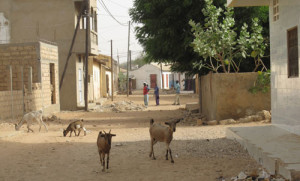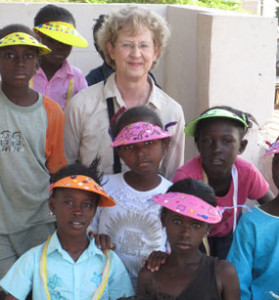 What’s it like out there in the sub-Saharan town of Guéoul, Sénégal? Where people struggle to make a good life for themselves? Where some struggle just to make ends meet? Where poor girls are frequently made household servants or married off at age 12 or 14 because their families can’t support them and certainly can’t afford to keep them in school? Picture a town of cinder block houses, many covered with tiles, and of grass-roofed huts in a sea of sand. Imagine the goats and chickens roaming the sand streets. See in your mind’s eye the donkey carts moving computers from classroom to classroom. Think of families living together taking care of each other, of patriarchs taking in children of relatives or friends to give them a better life. Did you know that Sénégal has been a stable Muslim democracy since its independence from France in 1960?
What’s it like out there in the sub-Saharan town of Guéoul, Sénégal? Where people struggle to make a good life for themselves? Where some struggle just to make ends meet? Where poor girls are frequently made household servants or married off at age 12 or 14 because their families can’t support them and certainly can’t afford to keep them in school? Picture a town of cinder block houses, many covered with tiles, and of grass-roofed huts in a sea of sand. Imagine the goats and chickens roaming the sand streets. See in your mind’s eye the donkey carts moving computers from classroom to classroom. Think of families living together taking care of each other, of patriarchs taking in children of relatives or friends to give them a better life. Did you know that Sénégal has been a stable Muslim democracy since its independence from France in 1960?
Did you also know that Sénégal is next door to Mali? Where an armed conflict broke out in the northern part of the country in January 2012? Tuareg rebels took control of northern Mali in April. The conflict was complicated by a military coup that took place in March and later fighting between Tuareg and Islamist rebels. In response to Islamist territorial gains, France launched a military operation in January 2013. French and Malian forces recaptured most of the north.
 What would it be like to live just below the Sahara in a small town subjected to Islamic extremists? Watch the movie “Timbuktu” to discover what it might have been like in Senegal’s neighbor Mali. Set in a village near the historic city of Timbuktu, Mali, the film gives you a flavor of what life would be like in Guéoul if it were under the control of Arab jihadists. The images are of a village not dissimilar to Guéoul, with mud rather than cinder block homes and tents rather than huts. But the sand streets are the same. The moderate Islam practiced by the people of Mali is the same as that practiced in Senegal. The movie shows the happiness and sadness of ordinary human existence as well as the cruelty and ridiculousness of the extremists in control. It was filmed in Mauritania, another neighbor of Sénégal.
What would it be like to live just below the Sahara in a small town subjected to Islamic extremists? Watch the movie “Timbuktu” to discover what it might have been like in Senegal’s neighbor Mali. Set in a village near the historic city of Timbuktu, Mali, the film gives you a flavor of what life would be like in Guéoul if it were under the control of Arab jihadists. The images are of a village not dissimilar to Guéoul, with mud rather than cinder block homes and tents rather than huts. But the sand streets are the same. The moderate Islam practiced by the people of Mali is the same as that practiced in Senegal. The movie shows the happiness and sadness of ordinary human existence as well as the cruelty and ridiculousness of the extremists in control. It was filmed in Mauritania, another neighbor of Sénégal.
Although the Islamist rebellion in Mali was suppressed with the help of France, the possibility is a reality in western Africa. What better way to prevent Islamist terrorists from infiltrating a peaceful Sénégal than to help educate her people, especially her most vulnerable citizens—poor girls. What better way for the United States to make friends with African countries than to be involved in helping them and to be admired for it. That is what Friends of Guéoul is about.
